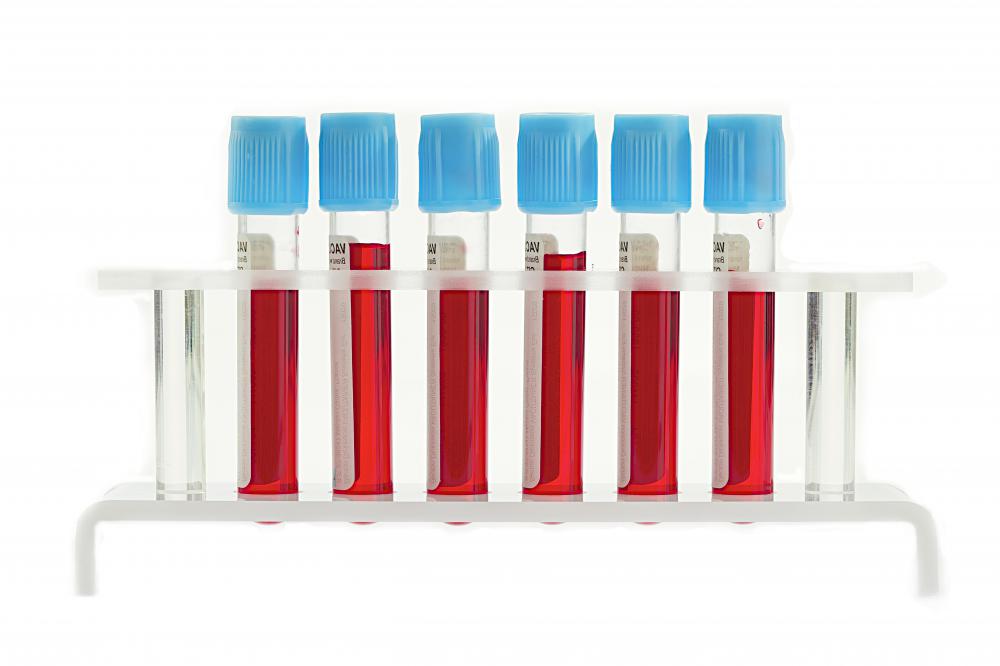At WiseGEEK, we're committed to delivering accurate, trustworthy information. Our expert-authored content is rigorously fact-checked and sourced from credible authorities. Discover how we uphold the highest standards in providing you with reliable knowledge.
What is Clinical Pathology?
Clinical pathology is the study and diagnosis of diseases by analyzing body fluids. Clinical pathologists study fluids such as blood and urine to diagnose diseases. A clinical pathologist may choose to specialize in one type of pathology, such as chemistry, hematology or microbiology.
In the United States, clinical pathologists are certified through the American Board of Pathology. This board licenses physicians in a variety of specialties. In some countries, it is not necessary to be a doctor to specialize in clinical pathology. Some countries allow other medical professionals, such as pharmacists, to receive licensing.

Each area of specialization in clinical pathology has its own unique set of standards. Clinical chemistry, for example, focuses on the study and analysis of body fluids. Clinical chemistry is also known as chemical pathology. Laboratories that focus on chemical pathology run tests to measure hormone function, the immune system and antibody function and the function of drugs on the system, or pharmacology.

Another clinical pathology specialty is in hematology. These clinical pathologists work with blood banks to process donated blood so that it can best be used. While the majority of blood that is donated is donated as whole blood, it is often broken down into various components before it is used.
Blood that will be used for transfusions will not have the components separated out, but will have a preservative added. Some collected blood is spun in a centrifuge. This causes the heavier components to settle to the bottom, separating the red blood cells and plasma. Proper handling of blood after collection is vital for the safety of the patient as well as to prevent valuable blood from being wasted.
A final specialization in clinical pathology is medical microbiology. Medical microbiology is the study of bacteria, viruses and parasites. This type of pathology is closely related to the study of immunology and the study of infectious diseases.

Clinical pathology is one medical career path that has many branches. Some clinical pathologists will work closely with others, while others will spend a great deal of time alone in a laboratory. When deciding on what area to specialize in, you should take into consideration how much solitary time you want as part of your work load. Regardless of the specialty, few clinical pathologists work directly with patients.
AS FEATURED ON:
AS FEATURED ON:
















Discussion Comments
@browncoat - Still, I wonder if they could combine this kind of testing with giving blood or something. I would be happy to give blood if it meant that I would get a clean bill of health every few months from being tested. And I know they already test for major things when you give blood anyway, so it wouldn't be that much of a big deal to do a few more tests and then make the results available to the person.
I think they do actually tell you if you happen to have something they routinely test for though, so I guess they already do this in a way.
@Fa5t3r - Well, there are some things that can easily be tested at home, like blood sugar levels. But often when they are looking for disease, they have to actually grow the bacteria in the lab in order to confirm that it's there. That's not something I can imagine people doing at home without a lot of training and safety equipment.
I've always thought that there should be some way for people to just test themselves for this kind of stuff at home. If you could run a lot of blood and urine tests on yourself every six months you could really build up a picture of your overall health and it would catch anything that might be otherwise undetected.
People only ever seem to get clinical pathology tests when they already feel sick, which might be too late. Regular testing seems like it would be a better idea.
Post your comments